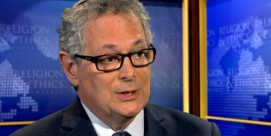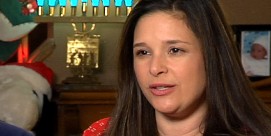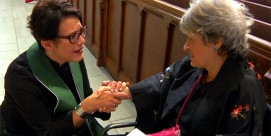In This Episode << SLIDE LEFT TO SEE ADDITIONAL SEGMENTS
Robert Wuthnow Extended Interview
Read more of Bob Abernethy’s interview with Princeton sociologist Robert Wuthnow:
Q: When Americans talk to pollsters about their religious beliefs and practices, what they say can sometimes be exaggerated. Describe that phenomenon briefly and tell us how big you think it is and why it exists.
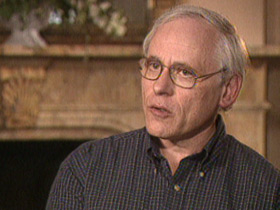
A: When you look at surveys that ask about church attendance (some of the most common ones are done by the Gallup poll, and others are done out of the University of Chicago and [by] a few other pollsters), they give varying numbers. Often you get numbers [that] around 40 percent of the public has been to a religious service in the past week, or something like 35 percent claim to go almost every week. People have looked more closely at communities. They’ve gone around and looked in church parking lots, and they’ve asked people to fill out time-use diaries during the past week and have talked to ministers. They have trouble making the numbers come up to that high a level. Nobody knows quite how exaggerated the numbers might be. I’m guessing, for example, from what I’ve seen, that if 40 percent say they’ve been there in the past week, it’s probably closer to 28, 29, maybe 30 percent. Some of it is that people want to appear involved in something as respectable as religion, and some of it is they just want to be cooperative with the person asking the surveys. So if the answer seems to be, “Well, yes, we want you to say ‘yes,'” well, then people cooperate and say “yes.”
Q: Could it also be that people believe it’s the truth when they’re saying it?
A: Some people do. They may say, “Yes, I’ve been there in the last week,” and they’ve forgotten that, well, last week they were sick, or last week they were on vacation. What they do remember is that they’re active in their church. They go to church regularly. And so they give themselves a little bit of slippage, and that allows them to say what they want to say, which is, “Yes, church is important for me.”
Q: Even discounting the exaggeration of poll data, what can be said about the prevalence of religion in America?
A: That we’re a very religious country, certainly compared with Europe, where participation rates are much lower. We really are a quite remarkable country in that respect.
Q: And why is that?
A: There are a lot of reasons. Some of them are historical. We have a tradition of being a religiously pluralistic country — competition, lots of churches, a tradition of voluntarism… The important thing is that churches have maintained themselves pretty well by providing programs that are of interest to people. I’ve always been surprised at how religious we are. You know, you hear stories about how we’re not a very religious country, we’re materialistic, we’re secular — but we’re really very, very religious.
Q: You and others have suggested that traditional religious beliefs — creeds and doctrines — may not be quite as important for many people as they used to be. What’s going on?
A: If we look back over a 50-year period, when we’ve been able to do research, it looks like religious beliefs just aren’t as important as they used to be. Why is that? One thing may be that the churches are not emphasizing beliefs and doctrines as much as they did in the past. Another may be that we’re a more skeptical society. We’ve had so many different beliefs — not just religious beliefs, but scientific, philosophical, popular beliefs. We’re not sure that those fine points of belief matter so much anymore. We’re more convinced that it’s practice, it’s experience, it’s having some kind of relationship with God that matters. I’m thinking in particular about a woman we interviewed a couple of years ago as part of a research project. We asked her to summarize her religious beliefs. And she mentioned a few standard things — belief in God, belief in Jesus, belief in life after death, belief in the Bible. She said, “You know, what’s really important to me is practice, not doctrine. It’s what I pray about. It’s what my religion does for me when I get up in the morning. It’s what it does for me when I go to work and how it helps me with my family. That’s what’s important.”
Q: What takes the place of the old, central importance of belief?
A: People are very interested in religious experience, whatever that may mean. They will talk about a time when they were sitting in church and just felt that God was with them, or a time at the bedside of someone who was dying and [they] felt that an angel or God was close to them, or being out in nature and feeling just awe-inspired by the beauty of nature. And somehow, that’s what affirms to them both the existence of God and the fact that God cares for them personally.
Q: What would be your definition of “spirituality”?
A: My definition of “spirituality” comes from talking to a lot of people and asking them what their definition of “spirituality” is. Most people define it very simply, and they say it’s their relationship to God. A few people will use some other word — a “higher power,” or “divine being” — but [for] most people, it’s that personal relationship with God. And then spirituality is everything that builds up around that — their prayer life, their attempts to be of service, their attempts to be faithful. Spirituality is very personal, but it has that transcendent connection. That’s the important thing.
Q: Describe and evaluate, if you can, the growth in recent years of interest in spirituality.
A: One of the surveys that I did about a year ago showed that 43 percent of the public said their interest in spirituality had been increasing in recent years. Only 7 percent said it had been decreasing. The rest said it had stayed about the same. That’s one indicator that spirituality is just of much more interest now than it was maybe five or 10 years ago.
Q: Is it something that people pursue both within traditional religious institutions and outside them?
A: Yes, people experience spirituality and find ways to pursue it certainly within their religious traditions — Catholics, Protestants, Jews. Organized religion continues to be very important to people’s spirituality. Other people have found that it just doesn’t quite work that way for them, so they’re off on the road someplace. They’re going to retreat centers, or they’re reading books, or they’re meditating on their own. Both of those are going on.
Q: In recent years, there’s been a big increase in the number and the visibility of non-Christian religions in the U.S. — Islam, Buddhism, Hinduism, and others. How do you sum up the reaction of American Christians to having more and more people of other religions in their midst?
A: I would sum up Christians’ reactions to other religions in one word at this point: indifference. It really surprises me. You talk to people and you say, “Okay. Your son’s best friend in school is Hindu, or Muslim. “Your neighbor is a Buddhist,” or a Hindu. “The building right across the street from your church is a Hindu temple. What are you doing about it? How do you think about this?” People haven’t thought about it. They just exist side by side with these people. They block out the religious identity and don’t pay much attention to it.
Q: You couldn’t call it “tolerance”?
A: You could call it tolerance and, of course, people use the language of tolerance, because when you press them, then they’ll say, “Well, of course, a Hindu, or a Muslim, or a Buddhist has every right to practice, just as we do.” They flip into the language of rights — civil rights, civil liberties, and so forth. Push people, though, and say, “Well, but theologically, what do you think? They really believe something different from you.” And it’s, “Well, that’s okay. That may be true for them. What I believe is true for me.”
Q: What does that mean? What does this indifference or tolerance mean about commitment to truth, or feeling that your religion is the truth, or at least more true than anyone else’s? What does it mean about that?
A: As a culture we’re only beginning to face up to the sense of doubt that we have — within the Christian community, especially — about “truth” as it’s traditionally been defined. For many, many centuries, Christians have thought that they had the truth, and that other people didn’t have the truth in the same way. And now, Christians are not quite so sure of that. They’re more likely to say, “This is true for me. I know it from my experience, but I’m not willing to say anything about anybody else.” And that radically changes the meaning of truth, when it’s just true for you and not necessarily true for somebody else.
Q: What about white evangelical Protestants who feel that they have a mission from Jesus to spread the gospel, to preach it to everybody, to convert others out of love so that they can have eternal life? They feel a real obligation and duty to convert non-Christians. How do they put that on one side together with, on the other, the desire to be hospitable, or the desire to be tolerant? How does all this cut for somebody who feels a real duty to proselytize?
A: Evangelical Protestants I’ve talked to fall into two categories. There are those, often in leadership positions, who say, “Yes, as an organization, denomination, or church, we have that responsibility to proclaim the Christian gospel.” And then there’re the others at the grass-roots level — the members — who may be very firm in their beliefs, but they say, “That’s not really my role to get out there. I can live as a good Christian. Hopefully, they’ll see something in my lifestyle. Or perhaps, if they’re really in need, they’ll come to me. But I’m not going to go out of my way. That would be an intrusion on their rights. That would be a lack of respect. So all I can do is be an example and leave it at that.”
Q: Do you feel that down the road there’s going to be much more of a sense of these “new” religions being a challenge to the “true” Christianity?
A: Oh, I think so, yes. At this point, it’s often easy, still, for churches to treat new religions with the “out of sight, out of mind” principle governing. They just may be able to ignore the fact that there are large numbers of other religious people in their community, but that’s changing very, very rapidly. You know, we’re not in a situation where we can only look to some other country and say, “Oh, well, there’re Hindus,” or Muslims, “living there.” They are living in our own neighborhoods, and in increasing numbers.
Q: What effect do you think these new religions will have down the road on this country?
A: It’s hard to tell at this point. One scenario, at least, that makes a lot of sense is that we will have a kind of leavening of the religious spirit in this country — meaning that there will be, on the one hand, more tolerance and acceptance; but, on the other hand, more attempts to look back within our own religious traditions and say, “Well, what does it really teach? What do I really believe?” Because once you start comparing it with another one, then you have to look at some of those questions.
Q: In the survey you did about mainline Protestants, you got two clearly opposing answers on this question of “my truth” versus somebody else’s truth. Christians thought Christianity was, indeed, true. But then a couple of questions later, it turned out that they also thought that there was truth in other religions — and by about the same proportion. That seems to reflect a good deal of confusion.
A: We did a national survey in April 2000 of about 5,000 people. And one of the statements we asked people to agree or disagree with was, “Christianity is the best way to know God.” About two thirds of the public said, “Yes, we agree with that.” But then just a little bit later in the survey, we asked them to respond to another statement that said, “All religions are equally true.” And about two thirds agreed with that statement, too. These were two seemingly contradictory statements. Lots of people were agreeing with both.
Q: And what did you make of it? How do you explain that?
A: What that left me with was just a huge question mark about how much are people thinking deeply about the truth of their own religion, their belief in Christianity, and what they mean by other religions being true. I don’t think a lot of people have really sorted that out, and I think that’s going to be a big issue for people in churches, pastors, people in seminaries — to start sorting out or providing some clear guidance.
Q: What do you think that sorting-out process will cause?
A: It will cause people to be much more concerned about what’s true and what’s not true, both in their own tradition and in other traditions. I don’t think it’s likely to lead to a kind of religious universalism or people saying, “Oh, we all believe in the same thing, and we just do it in different ways.” When you talk to people who have thought seriously about these questions, they begin to say, “Oh, these religions really are pretty different when you get right down to it.” And then they continue to struggle with, “Well, there might be some truth,” and “How is that possible?” and “Does Christianity really teach that it’s the only true religion, or have we just misinterpreted it?” Lots of questions come out of that.
Q: Overall, how do you think the battle is going between religion, in general, in this country and, on the other hand, the power of science, secularism, popular culture’s overwhelming emphasis on the material, and the importance of individual rights?
A: I tend to vacillate between being a cautious optimist and a cautious pessimist. On my good days, I look at religion and say, “Well, the trends seem pretty good, mostly.” Around most neighborhoods there are vibrant churches doing important things in their community. You figure there’s truth being taught, preached in those churches. So that leads me to be optimistic. At the same time, though, maybe on my bad days, I look at some of the trends that suggest things aren’t going so well — surveys of teenagers, for example. You find that there really is not much serious commitment to religion among teenagers. Some studies suggest that the depth of activity in churches has been diminishing. And then if we look at it strictly from the standpoint of the secular society — marketing, advertising, higher education, government, science, tremendously powerful institutions that command billions and even trillions of dollars — they have an enormous impact on shaping the culture, compared to what the churches can do. I will say that I’ve been surprised that religion is doing as well as it is. And the reason I’m surprised is that there are so many trends working against it. For example, some of the trends going on in the family — just something as simple as the rising divorce rate over the last 30 or 40 years. Divorced people go to religious services much less often than married people do. Separated people do, too; and single people do, too. One would think that trend, that change in the family, would work against church participation, and [it] probably is. And yet, there are other things that seem to be making up the difference, so that church participation is continuing. Other factors have the same effects. That’s just one example.
It appears to me that religious commitment in our society — however you think of that — is holding its own against enormous odds. So many things are working against it, and yet it’s doing fairly well.
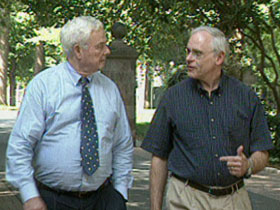
Q: Could you tick off the most important of those things that are working against it?
A: The rising divorce rate. And, as it turns out, the inclusion of women in the paid labor force has worked against it, because women used to do all the volunteer work around their congregations. Another factor has been the change in neighborhoods. People don’t participate in their neighborhoods or know their neighbors as much anymore. Yet most churches — in the past, at least — have been neighborhood-based. And then another change is that we have experienced some decided trends in belief. The number of people, for example, who believe that the Bible is literally true has dropped remarkably since the 1960s. And people who don’t believe that don’t participate in their religious organizations nearly as much as people who do. So that may be a kind of broader crisis of belief. All of those things work against religious participation.
Q: And science? And the growth in the number of people who might be described as secular? And that gets us to politics and policy and Washington.
A: I remember one religious leader I talked to said he thought the big trend was that people don’t care about what happens in Washington anymore. What they care about is in their own neighborhood, so that often means that they do one-on-one social-service activities — help their neighbors, help the poor. Maybe through their church they even get involved in the local school board election. But they’re just indifferent to what goes on in Washington, and that may be hard to measure and hard to understand. Because we, of course, have pressure groups — whether they be Christian Coalition, or mainline organizations, Catholic organizations — in Washington. But those organizations often don’t have much of a direct line back to local churches and synagogues.
Q: Is there such division within religious communities that there is no one voice, that one religious voice cancels out the other and, therefore, it’s hard for people to know what people of faith might want in terms of politics?
A: Oh, sure. Look at almost any issue, and there are different religious positions on it — most recently, stem cell research. [There are] lots of different positions, including ones in the middle, “we don’t know,” and so forth. In my mind, that’s how it should be. Religious communities ought to be grappling with these issues and coming up with different answers. But as a people, we’ve been taught that there ought to be an answer. I think maybe we’ve been taught that by science. You ought to be able to go out, investigate, and come up with a single answer that everybody agrees on. These kinds of moral and ethical and theological issues don’t fall out that way.
Q: So how would you evaluate the influence that religion has had, and is having, on the society as a whole?
A: If you could imagine a society like ours without religion — just strip away all those 300,000 local congregations — we’d be in a big mess. If you look at it that way, religion does help people in their communities; in their family lives, their personal lives; gives them meaning; gives them attachments to their neighbors, and so forth. We’d be in big trouble without religion. On the other hand, if you say, “But, compared to what?” Compared with advertising, or the power of government, the power of business, religion is pretty weak. I’d say it’s a vital player, but it’s one player among many. Sometimes it’s David among a whole bunch of Goliaths.
Q: How can you describe the influence of mainline Protestants these days?
A: We did a big study that took us several years. Mainline Protestantism, we concluded, is much stronger than a lot of people thought. People have been looking at declining memberships. Well, those declines pretty well ended in the early 1990s. Mainline memberships have been pretty stable for about 10 years now. There are many, many vibrant churches, well-educated clergy, people who are involved in their churches; even at the national level, [there are] a lot of interesting activities going on, often behind the scenes, and yet that are making a difference in terms of some of the good things that we want done in this society.
Q: Why did the mainline decline so much?
A: Well, the mainline declined mostly in the 1960s and early 1970s, studies now are telling us, largely because of what’s been called the “demographic factor.” People who belong to mainline churches tend to be more middle-class families. That meant that they had their children later, and they married later, in the first place — had their children later, had fewer of them. There were just fewer children coming along to replace the members that were gradually leaving those churches.
Q: There’s a theory, going back to the maps used on election night 2000, about the blue states and the red states — red states being everything in the middle and blue states being on the edges. The theory is that the country is deeply divided by religion. What do you make of that idea?
A: I don’t think there’s much to that theory. We are divided by other kinds of social factors — small town versus big city, heartland versus coast, certain kinds of occupations, race, ethnicity, and so forth. But on religion, if you look at people who are staunch evangelicals, let’s say, versus people who are staunch members of more liberal congregations, there’s often as much crossover in what they think and how they vote as there are differences.
Q: You’ve looked at religion and the arts, and what have you found?
A: Religion and the arts is a fascinating subject now, because participation and interest in the arts has increased enormously over the past 30 years or so — partly through school programs, partly through museums and galleries and symphonies, partly just because we’re an affluent society and we have more time to spend on the arts. What’s puzzling to people is the following question: Is this interest in the arts working against religion in some way, becoming a substitute for it? Or do the two go hand in hand? The answer seems to be that they go hand in hand. The more interested people are in the arts, the more they also are in spirituality. And if they’re especially interested in spirituality, then they start getting involved in their churches and synagogues again. An example of this would be a woman we talked to in California as part of a research project. Early in her marriage, she’d had a very severe personal crisis that left her emotionally a basket case. Through therapy and counseling, she started to be involved in some kind of artistic activity. She wasn’t a professional artist at all, but it was a way of expressing some of the deep pain and anguish that she had felt — making pots, painting, things like that. She eventually recovered and went on to be much more active in her church. She was just so angry at God for a while that she couldn’t participate in the church at all. Today, she’s running a center that helps abused women, and she uses the arts as one of the ways to help these women.
Q: So it is not just an interest in the arts as a spectator. It is participation in artistic activity that does it.
A: Yes, it’s very much hands-on participation — writing poetry, making pottery, playing the piano, whatever it might be. It seems what this does for people is to transport them out of that busy, hectic life they lead at work and [in] their family, [and] gives them a chance to meditate and reflect. When they start doing that, then they find spirituality is a big part of that.
Q: What’s the source of the idea that “We’re all Protestants now”? Is there something about the culture that is so deep and so strong that it affects all religions and makes them more individualistic and pragmatic than they otherwise would’ve been?
A: Oh, sure. The culture affects everybody. You talk to some Muslims who’ve recently immigrated into the United States, and they’ll say, “Well, our practice of religion’s a little bit different.” Sometimes they’ll say it’s more individualistic. I’m not sure what they mean by that. Hindus sometimes say the same things. Often, what they mean is that those broader community ties that made such a difference before, where the whole neighborhood would practice together and go to daily prayers together — that’s gone. Maybe even the family is divided. So people have to go to the mosque or the temple by themselves and pray by themselves.
Q: How serious do you think it is for religion, generally, that there has been apparently over recent years a slow, steady increase in the number of people who say they are not religious?
A: I’ve seen these statistics, and they suggest an edging up in that number. It’s not a large percentage of the population by any means. Most of us still find a way to say that we’re religious. But it has become more socially acceptable to say that you just don’t have a religious preference. For some of those people, they may be atheists or agnostics, if you push them. For others, it may be that they are just shopping around at the moment. If we think back to the 1950s or ’60s, Madalyn Murray O’Hair was the symbol of atheism. [It was] very unpopular to be an atheist. Nowadays, people don’t talk so much about atheists, but it is okay at least privately for people to say, “I’m not sure what I believe. I don’t feel attached to any religion. [It] doesn’t mean that I’m disinterested entirely, doesn’t mean that I’m lacking in spirituality, but I’m just alienated from organized religion at this point in my life.”
Q: “I’m spiritual, but not religious”?
A: Right.
Q: What about the growing number of nondenominational churches? That’s a big phenomenon. If all the nondenominational churches were part of one denomination, it would be the third largest denomination in this country, after Catholics and Southern Baptists. What’s going on there?
A: I’m surprised that the number of nondenominational churches has grown as much as it has. There are a lot of notable, large churches. What’s impressed me more is that even churches identified with denominations have, in fact, become nondenominational. You drive past them, [and a] big sign out front says “Grace Church.” In the fine print may be “Presbyterian” or “Lutheran” — like we don’t want to admit that we have a denomination. That’s because people themselves may be from different denominations. They may have married somebody from a different denomination, or moved in from another community. Their ties to a denomination just aren’t as important. So there’s an advantage to being nondenominational at this point.
Q: Can you say anything about the extent to which people find in religion an answer to the question about what is the good life and how to lead it?
A: That kind of moral question — being kind to one’s neighbor, loving one’s neighbor — is something that people claim to find in their religion almost without respect to what that religion is. That’s one thing that people say religion really does for them. It gives them that sense: “This is what a good person should be.” They will say, “I don’t always live up to it,” but this is the standard. Now, it may be that they would have come to that view anyway. But having it as part of the religious tradition, maybe having that example of Jesus, a moral figure, in their mind, at least, helps them.
Q: Talk a bit about the phenomenon of the small group in pursuing spirituality.
A: Small groups are an amazing phenomenon. Something between 35 and 40 percent of the public is involved in some kind of small group. Two thirds of those people are involved in a group that’s connected to a church or synagogue. We’re talking about Bible study groups, prayer fellowships, self-help groups like Alcoholics Anonymous, men’s groups, women’s groups. They’re enormously important. They give people a sense of community. They give people a way to talk about their spiritual life. People come together, pray together, study the Bible together. And they also learn how to be better people. We just finished a big study on forgiveness, and small groups are one of the main ways in which people now learn about forgiveness. They go there, they talk about it. They may study little booklets that tell about forgiveness. And, sure enough, they’re better able to go out and work on relationships in their own lives.
Q: What do people tell you these days about the reasons they attend a particular place of worship?
A: The reasons are very pragmatic: “It’s close by, so I don’t have to drive clear across town.” “It has a program for my kids.” “I like the pastor. He’s really interesting, gives great sermons.” “It has wonderful music.” “It’s big. It’s got a beautiful building.” “It’s got lots of programs, so if I get bored with this, I can go do something like that.” It’s usually not doctrine. It’s usually not denomination. People shop around, and they just sense that it feels right.
Q: So how religious are we, really?
A: One way to answer is to divide the public into four categories. Roughly the top quarter of the public, I would say, is very committed. They take their spiritual life very seriously, pray routinely, are active in their religious organizations, and so forth. The second quarter, and even the third quarter — the middle 50 percent of the public — is sort of religious. They’re involved. They go once in a while. They pray once in a while. They believe some of the right things. They may even think it’s pretty important to them, but they don’t make a big commitment to it. And the remaining quarter say they’re pretty much just indifferent to religion. My guess is that may not be terribly different than the way it’s been for a long time.
Q: What is the essence of being a mainline Protestant?
A: One thing has often rung true for me in comparing mainline Protestants and evangelicals: evangelicals look at an issue — particularly a theological issue, a religious issue — and say, “It’s really simpler than you thought. Jesus is the answer,” or, “It’s right here in the Bible.” A mainline Protestant looks at it and says, “It’s really much more complex than you thought. You’ve got this, and you’ve got that, this side and that side.” I think, in a way, that captures, for me, some of the difference.
Q: And the essence of being a Catholic?
A: For Catholics it’s harder because it’s a large, very diverse community. I’ve often been attracted, though, to Andrew Greeley’s term “communal Catholic.” The tradition, the liturgy is what really makes it stick.
Q: Once upon a time religion and spirituality seemed to be of a piece. We make a distinction between them now. What happened?
A: Organized religion lost its monopoly over spirituality. If you go back, say, to the 1950s, there weren’t many places to shop for spirituality, unless you went to an organized church or synagogue. Nowadays, you can go to the local bookstore,or a retreat center or some kind of New Age center, or you can order up tapes or CDs, or go to a concert. In other words, other parts of the society got in the act and found that they could supply some of our spiritual views. You can look at people and almost make a judgment of how hard they work at their spirituality. Of course, this is bad theology, because it’s all supposed to be grace. But some people think that, whatever their theology is, it really does require some commitment. And they actually spend considerable time every day praying or reading the Bible or being of service to other people or preparing lessons to teach at their church. That does take a lot of time and commitment, and that kind of commitment runs against the grain of our society that tells us we ought to be able to get fast food, instant meals, instant gratification. The rest of what goes on in American spirituality is catering to that impulse to get things as quickly and easily as possible.


